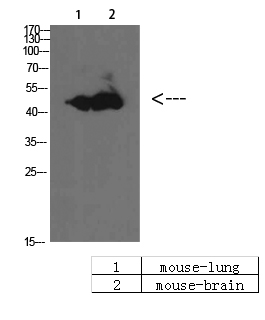BMP-10 Polyclonal Antibody
- SPECIFICATION
- CITATIONS
- PROTOCOLS
- BACKGROUND

Application
| WB |
|---|---|
| Primary Accession | O95393 |
| Reactivity | Human, Mouse, Rat |
| Host | Rabbit |
| Clonality | Polyclonal |
| Calculated MW | 48047 Da |
| Gene ID | 27302 |
|---|---|
| Other Names | bone morphogenetic protein 10 |
| Dilution | WB~~WB 1:500-2000, ELISA 1:10000-20000 |
| Format | Liquid in PBS containing 50% glycerol, 0.5% BSA and 0.09% (W/V) sodium azide. |
| Storage Conditions | -20℃ |
| Name | BMP10 |
|---|---|
| Function | Required for maintaining the proliferative activity of embryonic cardiomyocytes by preventing premature activation of the negative cell cycle regulator CDKN1C/p57KIP and maintaining the required expression levels of cardiogenic factors such as MEF2C and NKX2-5. Acts as a ligand for ACVRL1/ALK1, BMPR1A/ALK3 and BMPR1B/ALK6, leading to activation of SMAD1, SMAD5 and SMAD8 transcription factors. Inhibits endothelial cell migration and growth. May reduce cell migration and cell matrix adhesion in breast cancer cell lines. |
| Cellular Location | Secreted. |
| Tissue Location | Detected in mammary epithelia (at protein level). |

Thousands of laboratories across the world have published research that depended on the performance of antibodies from Abcepta to advance their research. Check out links to articles that cite our products in major peer-reviewed journals, organized by research category.
info@abcepta.com, and receive a free "I Love Antibodies" mug.
Provided below are standard protocols that you may find useful for product applications.
Background
Required for maintaining the proliferative activity of embryonic cardiomyocytes by preventing premature activation of the negative cell cycle regulator CDKN1C/p57KIP and maintaining the required expression levels of cardiogenic factors such as MEF2C and NKX2-5. Acts as a ligand for ACVRL1/ALK1, BMPR1A/ALK3 and BMPR1B/ALK6, leading to activation of SMAD1, SMAD5 and SMAD8 transcription factors. Inhibits endothelial cell migration and growth. May reduce cell migration and cell matrix adhesion in breast cancer cell lines.
If you have used an Abcepta product and would like to share how it has performed, please click on the "Submit Review" button and provide the requested information. Our staff will examine and post your review and contact you if needed.
If you have any additional inquiries please email technical services at tech@abcepta.com.













 Foundational characteristics of cancer include proliferation, angiogenesis, migration, evasion of apoptosis, and cellular immortality. Find key markers for these cellular processes and antibodies to detect them.
Foundational characteristics of cancer include proliferation, angiogenesis, migration, evasion of apoptosis, and cellular immortality. Find key markers for these cellular processes and antibodies to detect them. The SUMOplot™ Analysis Program predicts and scores sumoylation sites in your protein. SUMOylation is a post-translational modification involved in various cellular processes, such as nuclear-cytosolic transport, transcriptional regulation, apoptosis, protein stability, response to stress, and progression through the cell cycle.
The SUMOplot™ Analysis Program predicts and scores sumoylation sites in your protein. SUMOylation is a post-translational modification involved in various cellular processes, such as nuclear-cytosolic transport, transcriptional regulation, apoptosis, protein stability, response to stress, and progression through the cell cycle. The Autophagy Receptor Motif Plotter predicts and scores autophagy receptor binding sites in your protein. Identifying proteins connected to this pathway is critical to understanding the role of autophagy in physiological as well as pathological processes such as development, differentiation, neurodegenerative diseases, stress, infection, and cancer.
The Autophagy Receptor Motif Plotter predicts and scores autophagy receptor binding sites in your protein. Identifying proteins connected to this pathway is critical to understanding the role of autophagy in physiological as well as pathological processes such as development, differentiation, neurodegenerative diseases, stress, infection, and cancer.


